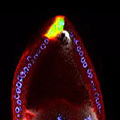Molecular biology is the field of biology that examines the structure and composition of cellular molecules as well as how these molecules interact in organisms. As new scientific techniques developed in the late 20th century, scientists began to ask more detailed questions of biological systems, by combining the methodological approaches of cell biology, biochemistry, and genetics. At this intersection of fields, molecular biologists ask questions about the molecular basis of biological processes, particularly about biological information storage and transfer, by way of coded molecules such as DNA, RNA, and proteins. For example, how is genetic information stored across a variety of genes? Or, what molecular interactions are necessary to control the rates of protein creation, and how do these rates coordinate with other cell signaling mechanisms in the cytosol? Thereafter, and ultimately, how do proteins interact with other coded molecules to carry out essential biological tasks in cells? This interdisciplinary field is relatively young, as it originated in the 1960s, when our knowledge of DNA and RNA molecular structure and the genetic code radically expanded. Since then, molecular biologists have developed laboratory tools to copy DNA, RNA, and manipulate genes. Some of these most well-known tools are the polymerase chain reaction (PCR), gel electrophoresis, Southern blotting, DNA sequencing, microarrays, and transgenic organisms. Using these approaches, molecular biologists can examine the dynamic molecular interactions in living organisms and understand how cells work at a molecular level. Today, molecular biology has again radically expanded with the discovery of noncoding RNA and other epigenetic mechanisms that impact information transfer within a cell, and, ultimately, the function of an organism.
Image Credit: Wu-Min Deng & John S. Deng. Public Domain.




